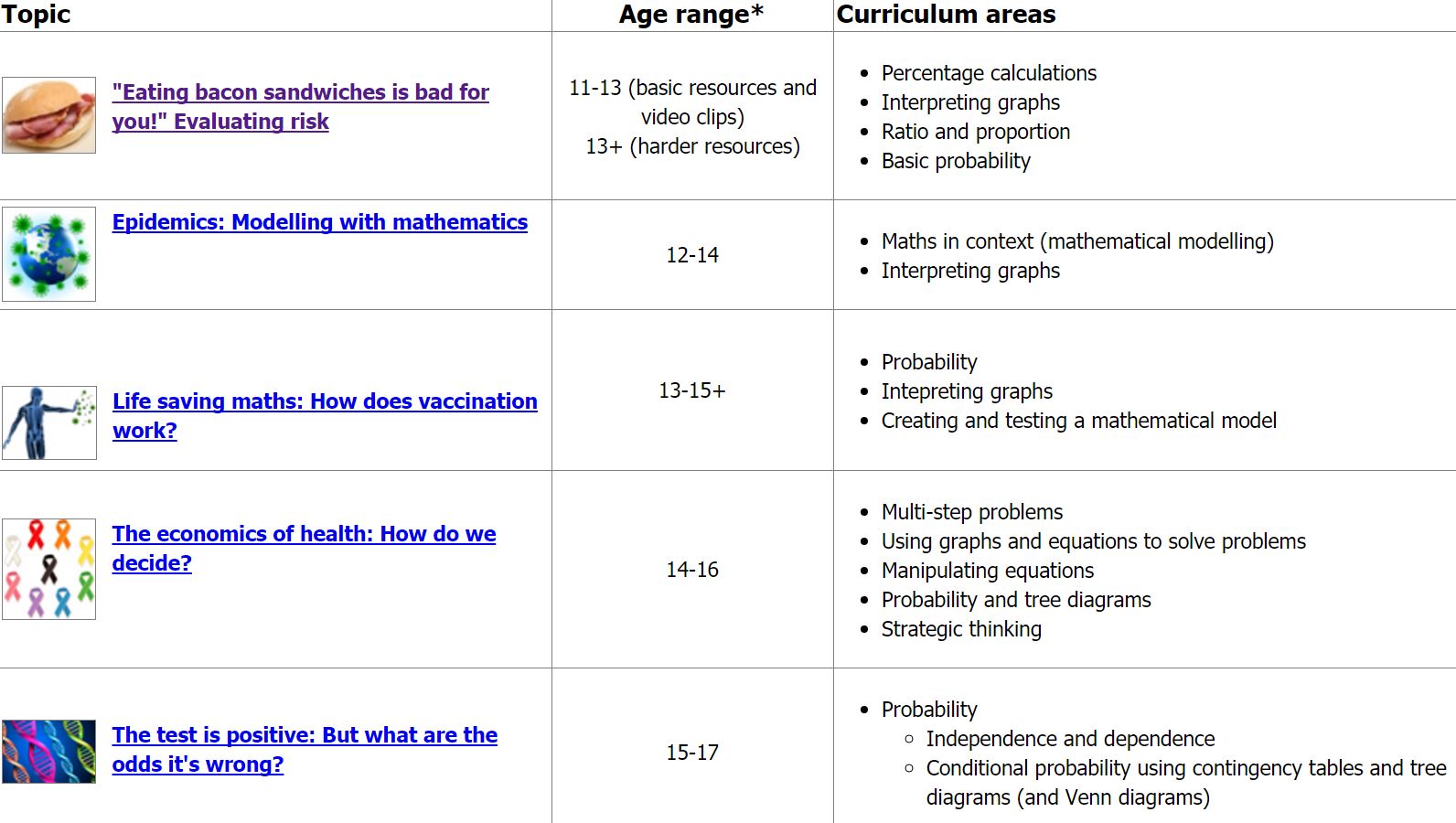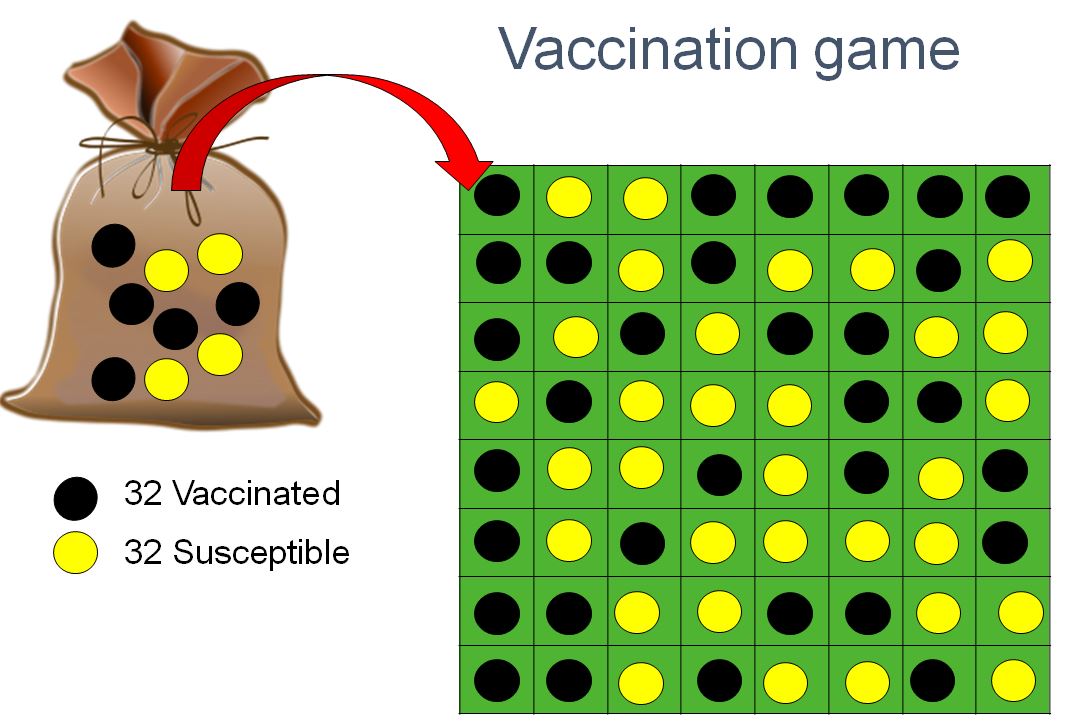Colleen Young x 2 = #hcsmca: Maths and Health
By @ColleenYoung and @colleen_young
@colleen_young: On Twitter a mere underscore differentiates our identities. Remove the underscore from my Twitter handle @colleen_young and you’ll meet @ColleenYoung, a maths teacher in the UK, interested in great methods and resources for learning. Colleen kindly reroutes any misdirected tweets about health care to me – the other Colleen. Being pulled into my world of health, community and #hcsmca got math Colleen to thinking about how our worlds intersect.
@ColleenYoung: There’s more reason that unites mathematics and health than separates them. As Dean Schlicter wrote “Go down deep enough into anything and you will find Mathematics.” Let it be so for mathematics and health. A quick search discovers a set of 5 lessons from Motivate using biomedical science to study math and extend the maths curriculum at the secondary level (ages 11-16). The lessons “show how maths underpins cutting edge biomedical research. They also introduce students to important ethical issues.” [1]
Since connecting with Colleen (of #hcsmca-fame) I have been keen to find further resources linking maths and health; many of the students at my school go on to study medicine in further education.
Furthermore understanding numeracy is integral to improving health literacy. As Russell Rothman et al. explain in their Perspective: The Role of Numeracy in Health Care, many people with adequate reading ability have poor numeracy skills.
“Many health-related tasks, such as reading food labels, refilling prescriptions, measuring medications, interpreting blood sugars or other clinical data, and understanding health risks, rely on numeracy.These tasks often require patients to deduce which mathematical skills to use and then to use these in multi-step fashion. Patients who had difficulty learning math skills during their primary education may now be too intimidated or simply unable to call upon these skills. For patients with chronic illness that rely on self-management to safely and efficaciously self-administer treatments this is particularly relevant and may place patients who lack adequate numeracy skills at increased risk for poor health outcomes. Numeracy may be a unique explanatory factor for adverse outcomes beyond the explanations provided by overall literacy.” [2]
Since October is health literacy month and by extension health numeracy, we decided to increase the Colleen factor to the power of 2 on #hcsmca this week. Join us on Wednesday, October 21 at 1pm ET and 6pm BT (time zone converter) for a discussion on health, numeracy and maths.
- T1: What numeracy skills are increasingly required of patients and family caregivers?
- T2a: What actions/projects/solutions have you seen in health and education to improve the public’s health numeracy level? Examples
- T2b: Can social media help improve health numeracy? How?
- T3: Who on Twitter has brought you into their world and led to thinking about your area of interest differently? How?
Photo credit: https://flic.kr/p/sUM3n
References
[1] Motivate, Millennium Mathematics Project, Cambridge University http://motivate.maths.org/content/MathsHealth/
[2] Rothman R, Montori V, Cherrington A, and Pignone M. Perspective: The Role of Numeracy in Health Care. Journal of Health Commun. 2008 Sep; 13(6): 583–595.
Resources & Reading from @ColleenYoung
From Motivate – Maths and our Health, five resource packs based on topical issues in biomedical science which support and extend the maths curriculum at secondary level (11-16 year-olds).
Note the link from Motivate to Plus Magazine’s Do you know what’s good for you? which is a series of articles, podcasts and interviews aimed at older students, teachers and general readers for a project funded by the Wellcome Trust exploring the role of mathematics and statistics in the biomedical sciences.
From Nrich we have STEMNrich where you will find a variety of resources, you could investigate epidemics for example or study the Influenza Virus and how it spreads. There are more resources on Disease Dynamics here, looking at substitution into formulae with Year 7 (UK age 11-12)  I used the formula given in the Vaccination Game resource, it worked really well to be able to talk to them about the real use of a formula.
I used the formula given in the Vaccination Game resource, it worked really well to be able to talk to them about the real use of a formula.
Skills for Health Resources includes some questions testing basic numeracy which would be suitable for younger students. (Look under Using the tools).
Further Reading
- Sara Nolte: Bad luck, bad science, or bad reporting?
- Stacey Johnson: Luck is on their side in “bad luck” cancer study
 …and finally – I cannot resist mentioning here the very aptly named 5-a-day from Mr Corbett which I have telling my students for some time now is very good for their Maths health!
…and finally – I cannot resist mentioning here the very aptly named 5-a-day from Mr Corbett which I have telling my students for some time now is very good for their Maths health!








Hah! I love the serendipity that brought you two together. Also, a great idea for improving health literacy. Next, maybe someone should tackle health literacy and basic chemistry?? ;)
LikeLiked by 1 person